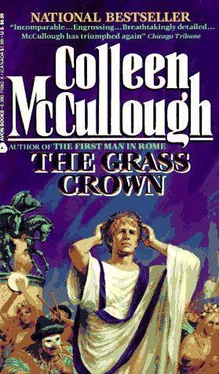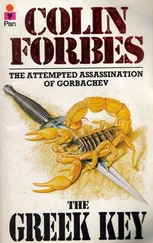Colleen McCullough - 2. The Grass Crown
Здесь есть возможность читать онлайн «Colleen McCullough - 2. The Grass Crown» весь текст электронной книги совершенно бесплатно (целиком полную версию без сокращений). В некоторых случаях можно слушать аудио, скачать через торрент в формате fb2 и присутствует краткое содержание. Жанр: Современная проза. Описание произведения, (предисловие) а так же отзывы посетителей доступны на портале библиотеки ЛибКат.
- Название:2. The Grass Crown
- Автор:
- Жанр:
- Год:неизвестен
- ISBN:нет данных
- Рейтинг книги:5 / 5. Голосов: 1
-
Избранное:Добавить в избранное
- Отзывы:
-
Ваша оценка:
- 100
- 1
- 2
- 3
- 4
- 5
2. The Grass Crown: краткое содержание, описание и аннотация
Предлагаем к чтению аннотацию, описание, краткое содержание или предисловие (зависит от того, что написал сам автор книги «2. The Grass Crown»). Если вы не нашли необходимую информацию о книге — напишите в комментариях, мы постараемся отыскать её.
2. The Grass Crown — читать онлайн бесплатно полную книгу (весь текст) целиком
Ниже представлен текст книги, разбитый по страницам. Система сохранения места последней прочитанной страницы, позволяет с удобством читать онлайн бесплатно книгу «2. The Grass Crown», без необходимости каждый раз заново искать на чём Вы остановились. Поставьте закладку, и сможете в любой момент перейти на страницу, на которой закончили чтение.
Интервал:
Закладка:
My son is dead. The last time you came to my house, my wife died. Given your trade, you ought to be precursor of joy, the deus ex machina of the play. Instead, you are the veiled one, precursor of sorrow. Never come to my house again. I see now that my patroness, Fortuna, does not permit rivals. For I have loved you with that same space inside me she regards as exclusively her own. I have set you up like an idol. To me, you have become the personification of perfect love. But she demands to be that. And she is female, both beginning and end of every man. If a day should come when Fortune finishes with me, I shall call to you. Until that day, nothing. My son was a good son, a fitting and proper son. A Roman. Now he is dead, and I am alone. I do not want you.
He sealed it carefully, summoned his steward, and instructed him as to whereabouts it was to be sent. Then stared at the wall whereon how strange life was! Achilles sat on the edge of a bier, holding Patroclus within his arms. Obviously influenced by the tragic masks of the great plays, the artist had put a look of gape-mouthed agony upon the face of Achilles that seemed to Sulla utterly wrong, a presumptuous incursion into a world of private pain never to be shown to the motley. He clapped his hands, and when his steward returned, said, "Tomorrow, find someone to remove that painting there." "Lucius Cornelius, the undertakers have been. The lectus funebris is set up in the atrium ready to receive your son for his lying in state," said the steward, weeping. Inspecting the bier, which was beautifully carved and gilded, with black cloth and black pillows upon it, Sulla nodded his approval. He carried his son to it himself, feeling the beginning of the rigor of death; the pillows were piled up and the boy placed in a sitting position, his arms held up by more pillows. Here in the atrium he would remain until eight black-clad bearers picked up the lectus funebris and carried it in the funeral procession. Its head was aligned with the door to the peristyle-garden, its foot with the outside door, on the street side of which cypress branches were fixed. On the third day, the funeral of Young Sulla took place. As a mark of courtesy toward one who had been praetor urbanus and would in all likelihood be consul, public business in the Forum Romanum had been suspended; those who would have been engaged in it waited instead for the cortege to appear, all clad in the toga pulla, the black toga of mourning. Because of the chariots, the procession originating at Sulla's house wended its way down the Clivus Victoriae to the Velabrum, turned into the Vicus Tuscus, and entered the Forum Romanum between the temple of Castor and Pollux and the Basilica Sempronia. First came two undertakers in black togas, then came black-clad musicians playing straight military trumpets, curved horns, and flutes made from the shinbones of Roman enemies slain in battle. The dirges were solemn, owning little melody or grace. With the musicians came the black-clad women who earned their livings as proper professional mourners, keening their own dirges and beating their breasts, every last one of them weeping genuine tears. A group of dancers followed, twisting and turning in ritual movements older than Rome herself, waving cypress branches. And after them came the actors wearing the five wax masks of Sulla's ancestors, each riding in a black chariot drawn by two black horses; then came the bier, held on high by eight black-garbed freedmen who had once belonged to Sulla's stepmother, Clitumna, and had passed into Sulla's clientele when she freed them in her will. Sulla walked in the rear of the lectus funebris, his black toga pulled up to veil his head; with him walked his nephew, Lucius Nonius, Gaius Marius, Sextus Julius Caesar, Quintus Lutatius Caesar and his two brothers, Lucius Julius Caesar and Gaius Julius Caesar Strabo, all with their heads veiled; and behind the men walked the women, dressed in black but bareheaded, hair in disarray. At the rostra the musicians, professional mourners, dancers, and undertakers assembled in the Forum below the back wall, while the actors wearing the wax masks were guided by attendants up the steps to the top of the rostra and seated upon ivory curule chairs. They wore the purple-bordered toga of Sulla's ancestors' high rank, that Sulla who had been flamen Dialis robed in his priestly garments. The bier was put upon the rostra, and the mourning relatives all save Lucius Nonius and Aelia attached in some way to the Julian house ascended it to stand and hear the eulogy. Sulla delivered it himself, very briefly. "Today I bury my only son," he said to the silent crowd which had gathered. "He was a member of the gens Cornelia, of a branch two hundred and more years old, containing consuls and priests, most venerable men. In December he too would have become a Cornelian man. But it was not to be. At the time of his death, he was almost fifteen years old." He turned to look at the family mourners, Young Marius in a black toga with his head veiled, for he had put on the toga of manhood; his new status placed him well away from Cornelia Sulla, who gazed at him sorrowfully from out of a torn and swollen face. Aurelia was there, and Julia, but while Julia wept and physically supported Aelia, Aurelia stood erect and tearless, looking more grim than sad. "My son was a beautiful fellow, well loved and well cared for. His mother died when he was very young, but his stepmother has been all that his real mother might have been. Had he lived, he would have proven a true scion of a noble patrician house, for he was educated, intelligent, interested, courageous. When I traveled to the East to interview the Kings of Pontus and Armenia, he went with me, and survived all the dangers foreign places entail. He saw my meeting with the Parthian envoys, and would have been the logical man of his generation for Rome to send to deal with them. He was my best companion, my loyalest follower. That illness should cut him down inside Rome was his fate. Rome will be the poorer, as I and all my family are the poorer. I bury him now with great love and greater sorrow, and offer you gladiators for his funeral games." The ceremonies on the rostra were now concluded; everyone got up, the cortege reassembled to wend its way toward the Capena Gate, for Sulla had procured his son a tomb upon the Via Appia, where most of the Cornelii were buried. At the door of the tomb Young Sulla was lifted by his father from his funeral couch, and placed inside a marble sarcophagus mounted upon skids. The lid was levered into position, it was pushed into the tomb by the freedmen who had carried the boy's bier, and the skids removed. Sulla closed the great bronze door. And closed a part of himself inside as well. His son was gone. Nothing could ever be the same again.
3
Several days after Young Sulla was laid to rest, the lex Livia agraria was passed. It went to the Plebeian Assembly with the stamp of the Senate's approval upon it, despite the impassioned opposition of Caepio and Varius in the House, and met unexpectedly bitter resistance in the Comitia. What Drusus had not counted on was opposition from the Italians, but opposition from the Italians he had aplenty. Though the lands in question were not theirs, Italian lands mostly bordered Roman ager publicus, and surveying had fallen far behind need for surveying. Many a little white boundary stone had been surreptitiously moved, many an Italian-owned estate incorporated land it ought not. A huge resurveying would now take place as part of the dividing of the public lands into ten-iugera plots, and discrepancies would automatically be rectified. Those public lands in Etruria seemed to be most affected, probably because Gaius Marius was one of the biggest latifundia proprietors in the area, and Gaius Marius didn't worry much if his Italian Etrurian neighbors filched a little of the edges of Roman State land. Umbria too was restive, though Campania lay low and said little. Drusus, however, was very pleased, and could write to Silo in Marruvium that all was looking good; Scaurus, Marius, and even Catulus Caesar had been impressed by Drusus's reasoning about the ager publicus, and between them managed to persuade the junior consul, Philippus, to be quiet. No one could shut Caepio up, but his words fell on largely deaf ears, partly due to his minimal skill as an orator, and partly due to a highly effective whispering campaign about people who inherited masses of gold no one in Rome would ever forgive the Servilii Caepiones for that.
Читать дальшеИнтервал:
Закладка:
Похожие книги на «2. The Grass Crown»
Представляем Вашему вниманию похожие книги на «2. The Grass Crown» списком для выбора. Мы отобрали схожую по названию и смыслу литературу в надежде предоставить читателям больше вариантов отыскать новые, интересные, ещё непрочитанные произведения.
Обсуждение, отзывы о книге «2. The Grass Crown» и просто собственные мнения читателей. Оставьте ваши комментарии, напишите, что Вы думаете о произведении, его смысле или главных героях. Укажите что конкретно понравилось, а что нет, и почему Вы так считаете.












